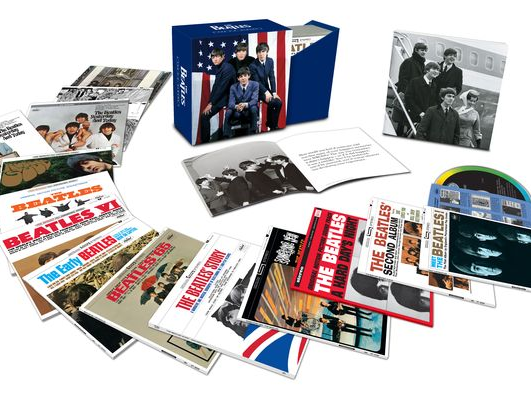Album Review: The Beatles — 'The U.S. Albums'

Unless you’ve been under a rock, missed the Grammys and close your eyes while you’re at the grocery store checkout, you’ve probably noticed it’s the 50th anniversary of the Beatles’ arrival in the U.S.
To mark the occasion, there’s a new box set called The Beatles: The U.S. Albums that, more than anything in the band’s recent catalog, is truly the sound of Beatlemania.
The 13-CD set, which compiles the band’s unique U.S. Capitol releases from 1964 to 1966, with 1970's Hey Jude thrown in for good measure, has caused an enormous stir amongst audiophiles, Beatles purists and some first-generation fans.
Since the announcement of the release late last year, the Internet has been alight with hand-wringing over what mixes would be — and should be — used to compile this set. Well, there’s an excellent breakdown of what’s what over at thebeatlesrarity.com, and the truth is that these aren’t really the albums you grew up with. But that doesn’t mean they aren’t still great.
“It seems like a bit of a scam not to use the original Capitol mixes,” musician Marshall Crenshaw, who’s also an alum of the late-1970s Broadway show Beatlemania!, told me recently when we chatted about the set. “I think the compression and the echo that they used in putting together those releases were a really important part of what made those records sound the way they did and what made them special.”
Crenshaw is right. But there are also plenty of places to find perhaps the first great rock and roll record, The Beatles Second Album, or the proto-folk perfection of the U.S. Rubber Soul and all of their bastard U.S. brothers, albums that bear no correlation to the Beatles’ U.K. catalog.
We’ve already had two volumes (eight CDs) of the Capitol Versions series, which were low budget but true to the original versions of the albums; armfuls of bootlegs, including the near-perfect Dr. Ebbetts releases that any industrious fan who can spell e-b-a-y can find, and, of course, the original vinyl versions, which still line used record and Goodwill stores everywhere.
Get The Pick Newsletter
All the latest guitar news, interviews, lessons, reviews, deals and more, direct to your inbox!
So perhaps these aren’t the albums you bought in the mid-Sixties. But in this singles-driven, iTunes world we live in, not only would the “duophonic” (fake stereo) mixes on those original LPs be unacceptable to more casual fans, but even songs that were more or less direct transfers by Capitol in the 1960s that we got a sampling of on CD in those Capitol Versions sets pale in comparison to the recent 2009 remasters Apple painstakingly prepared.
In other words, think of it from the Beatles’ point of view. Millions of people every year are buying your music, mostly as single downloads via iTunes and other digital services, and only a small (if very loyal) percentage of them expect to hear things exactly as they did in 1964. Rather, you’d certainly turn off any teenager, or “civilian” fan for that matter, who might download “She’s A Woman” or “I Feel Fine” in the fake stereo versions prepared by the infamous Beatle-hating Capitol exec Dave Dexter.
So with that in mind, and on those relative merits, The U.S. Albums is a fantastic set. There are five albums from 1964 alone that spell out the doom of the adult-oriented world so prevalent in the pre-Beatles years in big, bold letters. By the time of the 1965 and ’66 albums, it’s truly game over, and the power and commercial influence of the burgeoning youth culture has truly taken hold.
There are certainly things for diehards to quibble about. While Apple did try to recreate the early-Sixties experience by adding reverb to some of the 2009 remasters, many of the mono fold-down mixes or mixes unique to Capitol’s original releases are missing. And the oomph of the over-compressed Dexter tracks is gone, especially on the Second Album.
But the overall listening experience of hearing these albums in pristine quality is probably worth it for most casual fans. The packaging, too, is top-notch, and the booklet, with an excellent essay from Bill Flanagan, includes some great pictures, though don’t expect the level of detail afforded the 2009 CD or 2010 vinyl remaster sets.
In the end, I suppose a little perspective is warranted. “Serious” fans were just given a wonderful surprise holiday gift in the 1963 Bootleg release. So if this one is more for the casual or younger fan, curious to revisit or learn what all the fuss was about in those months after JFKs assassination, when the world was turned upside down by four working-class kids from Liverpool, I say let them have it.
Jeff Slate is a NYC-based solo singer-songwriter and music journalist. He founded and fronted the band the Badge for 15 years beginning in 1997 and has worked with Pete Townshend, Earl Slick, Carlos Alomar, Steve Holley, Laurence Juber and countless others. He has interviewed and written about everyone from the Beatles and Kiss to Monty Python and rock musicals on Broadway. He is an avid collector of rock and roll books and bootlegs and has an encyclopedic knowledge of all things Dylan and the Beatles. For more information, visit jeffslate.net.









